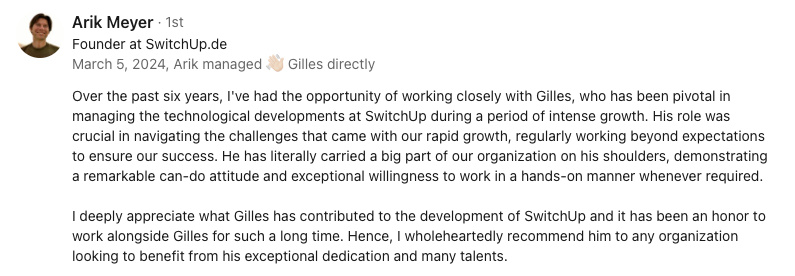Abstract:
The article explores the challenges and rewards of independent tech work, emphasizing how the lack of traditional structure and team support can lead to feelings of isolation, aimlessness, and even burnout among freelancers and remote professionals. Drawing on real anecdotes from tech communities—such as individuals who left corporate jobs only to feel adrift—the piece highlights that these struggles are common, not personal failings. The core message is that clearly identifying and living by personal values like autonomy, curiosity, and craftsmanship can provide much-needed direction, motivation, and resilience. Practical strategies are offered, including regular reflection, setting boundaries, choosing projects that align with one’s core beliefs, and seeking out values-driven communities for support and psychological safety. The article shares distinctive examples, such as using value-sorting exercises and posting reminders of key values, and recounts how personal validation through small, quiet wins—like helping others or completing meaningful tasks—can sustain motivation in the absence of external feedback. Stories of tech professionals regaining their footing by returning to their values during challenging times illustrate how minimalist, values-driven routines foster lasting well-being and community. Ultimately, the article argues that anchoring your work in personal values transforms uncertainty into steady progress, fosters real connections, and builds a resilient foundation that helps independent tech workers thrive through both routine days and major life changes.
When I stepped into independent tech work, it felt like trading a crowded train for an open road—so much freedom, but also a surprising sense of uncertainty. Without the daily structure of meetings or shared team goals, I sometimes wondered if I was even heading in the right direction. I used to think this was just my own quirk, but I quickly learned it’s common for freelancers and remote workers to feel isolated and lose their sense of purpose. The excitement of working on my own sometimes brought an unexpected drift, and even promising projects lost their spark.
What I overlooked at first was the quiet power of personal values to steady motivation and well-being. Values like autonomy, curiosity, and craftsmanship are not just trendy words for me—they’re guideposts that help me find direction and make meaningful choices, even if my office is a kitchen table or a noisy café in Lisbon.
Here, I want to share how a clear sense of personal values helped me stay steady in indie tech, including:
- Why losing structure can feel unsettling, and early signs of drift or burnout
- How clarifying my core values brought purpose and direction, even when working alone
- Practical ways I bring my values into work decisions, daily routines, and boundaries
- How values-driven communities supported me and offered psychological safety
- Simple steps to pinpoint your own values and use them as an anchor—every day or during big life changes
Whether you’re just starting out or want more meaning in your tech career, these strategies can help turn uncertainty into steady progress. Expect a bit of humor and some real, hard-won tips as you build a resilient foundation that travels with you wherever work may go.
Drifting Without Structure
Why freedom feels unsteady
My first days as an independent tech worker felt like stepping into open space—no meetings, no office, just endless possibility. But after leaving a structured job in Berlin and moving to Lisbon, I found myself missing the team rituals and shared mission. Even with years of experience, I sometimes drifted, unsure what to do next. This sense of aimlessness is common; research shows freelancers often feel isolated and question their own purpose. The move from corporate routine, especially in big cities, to independence can make these feelings stronger.
Losing the structure of a traditional workplace drained my motivation and made it hard to judge what really mattered. I used to thrive on clear goals and feedback, but suddenly I was questioning what was important. Many indie tech professionals I know describe this as a slow loss of clarity, where the lack of external validation makes it tough to keep momentum or measure success.
I remember one week in Lisbon when I realized I hadn’t spoken to another developer in days. My calendar was empty, and even though I had projects, I felt like I was floating. Without a team, even the most exciting project can feel hollow. The lack of a shared mission can take the meaning out of work, no matter how exciting it seemed at first.
The hidden costs of disconnection
Isolation in independent work is more than missing out on chats or hallway banter. Over time, it slowly drains confidence. Without outside anchors, it’s hard to know if a bad week is just a blip or a bigger problem. This loss of self-trust builds as a dull, nagging stress and can quietly lead to burnout.
Some warning signs I’ve noticed in myself and others:
- Constant stress and trouble switching off
- Growing resentment toward clients or projects
- Feeling cynical about work that used to be exciting
If emails make you roll your eyes or your calendar feels like an allergy, your work and values may be out of sync. Noticing these signals early is the first step toward a healthier, steadier independent career.
Without a personal compass, the risk isn’t just getting stuck in your work. It’s a slow loss of well-being. Spotting these signs early makes it easier to adjust and protect your health. So what can help keep you anchored when that external structure disappears?
Building on Values for Progress
Understanding values in indie tech
Personal values are my core beliefs. They quietly guide choices and shape what’s important, working behind the scenes in all areas of life. For me—and for many independents in tech—autonomy, curiosity, craftsmanship, and learning often come out on top. These aren’t just nice words; they help me decide when to say yes to a project or how to organize my day.
Different indie professionals I’ve met highlight values like:
- Autonomy and flexibility
- Work-life balance
- Ongoing learning and growth
- Doing meaningful work
These aren’t just preferences; for many of us, they’re the reason we went independent in the first place. Whether I’m in a busy co-working space in Berlin or a garden shed in Lisbon, my values stick with me and provide a steady sense of direction, even as everything else changes.
- Values act as a portable compass, helping me make decisions on the fly.
- They boost drive and resilience, especially when things get tough.
- They help me say no to projects that don’t fit, even if the money is tempting.
Living in alignment
When my work fits my values, satisfaction and motivation go up, while stress and burnout drop. There’s research to back this up: a 2022 study found that independent workers who set clear boundaries based on their values reported 30% higher well-being and 20% better productivity than those who didn’t. For me, setting a hard stop on work hours and refusing projects that clashed with my principles made a measurable difference—I slept better, felt less anxious, and actually looked forward to Mondays.
Living my values in small choices—like picking projects or setting new routines—builds pride and real motivation, which is extra important when there’s no daily praise from a team. Pausing for a moment to check if a task fits my beliefs goes a long way. Even tiny, values-based choices add up, creating a stronger sense of self.
During hard times, my values remind me why I chose independence. They become the anchor when other things shift, providing clarity and calm. I’ve noticed they also seem to draw in the right people, attracting others who share what matters to me.
Values build connection
Shared values foster community
I’ve learned that online spaces built on shared values bring people together in special ways. When I worked with a multicultural team in Beijing, it wasn’t just our tech skills that kept us connected—it was our shared commitment to openness and helping each other. In Berlin, I found that co-working spaces with a strong culture of curiosity and inclusion felt like home, even when I was far from family.
It’s not about tactical community-building, but about living your values out loud. When I shared my journey or made my process public—like working “in public” on open-source projects—it drew in others who valued the same honesty.
Small everyday actions help show your values and invite connection:
- Reviewing someone’s code or portfolio
- Sharing honest lessons from wins and failures
- Being clear about your workload or boundaries
These simple actions build trust and create a kind of psychological safety—a place where people feel safe to ask, share, and help.
Informal networks and safety
For indie tech professionals, values-driven networks often replace formal teams. Communities with clear, practiced values welcome honesty and help. In my experience, the best support came from informal groups—like the folks I met in Lisbon who shared my belief in learning and mutual aid. When I was stuck on a stubborn problem, it helped to know peers were ready to help just because we shared the same values.
In the end, belonging grows from shared purpose, not from obligation. When values are lived, communities grow stronger and stickier. But how can you actually figure out and act on your own values?
Clarifying and living your values
Simple ways to identify what matters
You don’t need a retreat or hours of soul-searching to find your values. A simple exercise, like sorting value cards, brings your priorities into focus. Online surveys or tools can do the trick too. These quick steps make it easier to spot what matters, so you can keep your priorities visible.
Some professionals, including me, put their top three values on sticky notes or digital reminders—on a monitor or in a notebook. It serves as a gentle nudge all day, helping to spot when actions drift from what’s important.
Try setting aside a few minutes each week, maybe at the end of Friday or a quiet Sunday, to jot down quick notes or reflect. This regular check-in helps spot problems early, so you can realign before things get off kilter. If work starts to feel disconnected, it’s a good time to reevaluate and adjust.
Recognizing and fixing value drift
Missing the signs of values drifting away from your work is easy. I’ve been there—constant stress, growing resentment for certain clients, or just not caring much about my projects. These show up before more serious burnout, so it’s better to notice them sooner than later.
Fixing things doesn’t need to be dramatic. Small tweaks—like turning down projects that don’t fit or changing work hours—reconnect your daily action with your values. Making these corrections over time helps you stay balanced and avoid bigger trouble later.
Practicing small changes builds confidence and resilience, so you’re less shaken by future challenges. Strengthen this habit and facing uncertainty becomes easier. Next, see how values can shape the routines that fill your workdays.
Values shape routines
Routines and boundaries
Letting values guide my routine makes decisions simpler. For example, when I decided “family first” was a top value, I kept evenings free and stopped accepting late-night work. When I valued transparency, I chose clients who supported open communication. I’ve met public figures who are known for setting strong boundaries and respecting personal time—clear examples of values at work. These choices keep resentment at bay and focus my energy on what’s truly important.
Setting values-based boundaries also makes it easier to say no. I’ve learned to turn down work that clashes with my principles, or pick projects aligning with openness and collaboration. Over time, these steady choices build self-respect and protect me from burnout.
Making values-driven choices over and over builds a sense of worth not dependent on anyone else’s approval. This is sturdier than moments of praise or public applause. But how do you stay motivated when no one is there to cheer you on? That’s where self-validation comes in.
Self-validation and quiet wins
With no regular feedback, I’ve learned to rely on “quiet wins.” Cleaning up a messy code file, helping a newcomer, or sticking to a work boundary all count. One of my favorite quiet wins was finishing a carpentry project in my Lisbon apartment—a bookshelf that actually stayed upright! Another time, I helped a friend debug a tricky Python script over coffee. These moments of self-validation keep motivation alive, even when no one’s watching.
Taking a moment to recognize these private wins supports long-term resilience and lowers the risk of burning out. For those moving to a new country or switching from big teams to solo work, this internal validation is critical. A simple journal or list of value-driven actions is enough—no need for big celebrations.
This kind of satisfaction became clear after moving to Lisbon. Small acts—like finishing that bookshelf or helping a friend with tech advice—felt truly rewarding when they reflected my genuine values, not just work goals. It shows values guide not just big decisions, but steady you during change.
Resilience through values
Learning from tough times
Sometimes, the only step forward is to pause and review what really matters. I’ve had moments—especially after burning out on a big project—where I had to go back to my core values. At those times, setting firmer boundaries and focusing on personal drive made the essential difference. Research highlights this values-first response as a common pattern among those who recover from setbacks. For example, a 2021 survey found that 68% of independent tech workers who realigned their work with personal values reported faster recovery from burnout.
For me, resilience meant walking away from high-paying but misaligned projects. I changed my idea of success to include rest and growth, not just more work or titles. Sometimes, I found renewed purpose more by helping others than chasing personal status. For example, mentoring a junior developer brought me more satisfaction than landing a flashy contract. These examples show values like autonomy, learning, and generosity work best as practical tools, not just abstract ideas.
During hard times, values are a steady decision filter. Minimal, values-driven routines stand up better than fancy wellness plans, helping indie tech pros stay grounded and resilient when things get rough.
Minimalist, values-driven routines
Studies find that simple, values-backed routines—like regular reflection, strong boundaries, and basic habits—bring more well-being than complex self-care programs. It’s a bit like choosing a few well-tended plants over a huge, demanding garden. Less effort, more real growth. Minimal routines last because they’re tied to what really matters.
Values are like the roots of a sturdy tree. Life’s storms come and go, but those roots keep you steady. Personal values give more stability than any checklist or trendy app.
Finding direction in indie tech work often starts with sorting out what matters most. Values like autonomy, curiosity, and craftsmanship aren't just theoretical—they become anchors for daily decisions, routines, and real connections, even when you work alone. Bringing these values into everyday actions turns uncertainty into a kind of calm, steady motivation. Small things, like setting boundaries or noting quiet wins, keep motivation in play and protect well-being over time. The path is rarely straight, but leaning into your values helps you handle both the ups and downs.














